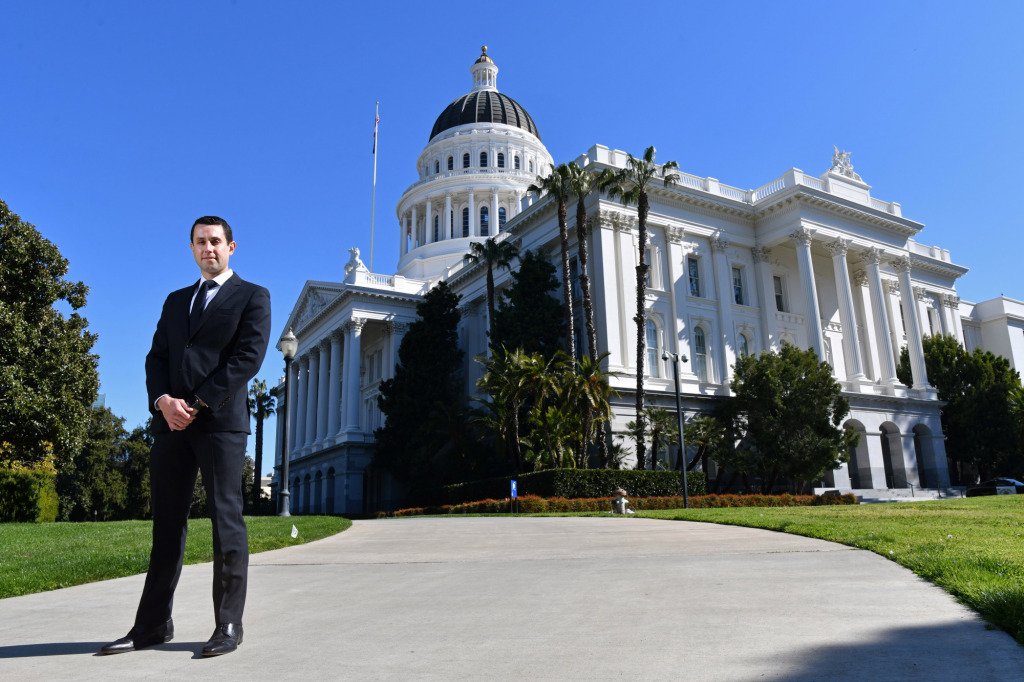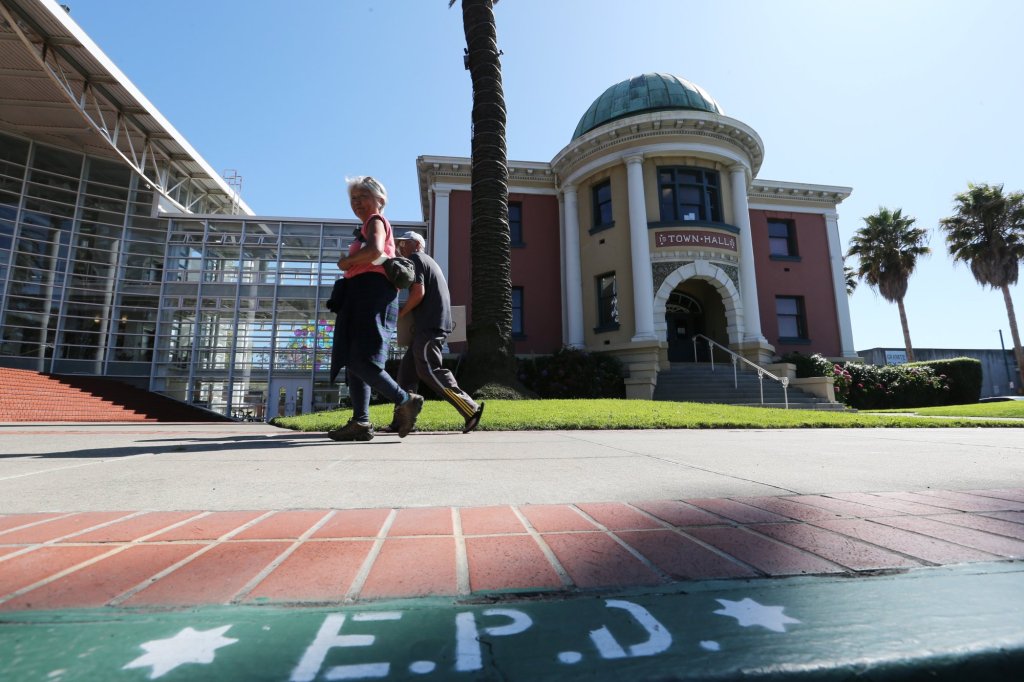As health officials scrambled last March with shelter-in-place orders to slow the spread of COVID-19, Jason Elliott was tackling another seemingly overwhelming problem: How do we keep the more than 100,000 Californians sleeping on our streets from dying of the virus?
As senior counselor to Gov. Gavin Newsom, Elliott serves as the governor’s top housing and homelessness adviser. He spearheaded two programs that together wound up being one of the state’s biggest feats during the unprecedented pandemic.
Project Roomkey has sheltered more than 35,000 homeless Californians in hotels and motels throughout the state, giving people over 65 or with medical conditions a safer place to ride out the pandemic. The second program, Homekey, created 6,000 units of long-term homeless housing in less than six months, by giving cities and counties the money to purchase hotels and other buildings, and expediting the permitting process.
It’s not enough to put a noticeable dent in the massive crisis of human suffering on our streets. But it’s a start, and more than California has done in a long time.
Elliott spoke with this news organization about those programs, how they started, and where we go from here. This interview has been edited for length and clarity.
Q: Describe what it was like in the governor’s office when the pandemic hit and you realized we could be dealing with a potentially devastating health crisis for our homeless population?
A: I remember it was a Sunday afternoon and I was walking my dog and I got a call from our then chief of staff Ann O’Leary and she said I need you at (the Office of Emergency Services) right now. So I hopped in my car, drove over to Mather where OES is, and went into a conference room where the governor, Ann and a few others were, and sort of started at that point to realize how fundamentally this was going to change everything.
And at that point, we were modeling a 56% attack rate for the virus, meaning that we expected 56% of Californians would get coronavirus at some point during the outbreak.
We have 108,000 unsheltered homeless people in California. And then the high risk factor you apply to that population. So when you do all that math, you’re looking at about 25,000 homeless people losing their lives from coronavirus. That was the challenge we were facing. For all we knew, this was going to happen in a matter of weeks.
We worked 25 hours a day to design what eventually become Project Roomkey. We started with a lot of ideas. Some were really good and some were not so good. Some were practical and some were impossible. And through really deliberative debate and discussion, we started to land on the idea of using hotels.
Q: Has Project Roomkey achieved everything you hoped it would?
A: I don’t want to leave your readers with the impression that Project Roomkey is going to once and for all solve homelessness in California, because it’s not. And that was not its intention. Project Roomkey was a public health emergency response to a once-in-a-century pandemic. And it aimed to protect some of the most vulnerable Californians from a disease that we didn’t know anything about. And if the question is has it worked, I think unequivocally the answer is yes.
Certainly there have been outbreaks on Skid Row, certainly there have been outbreaks in some of the homeless facilities in the Tenderloin in San Francisco. But nowhere near the levels that I mentioned to you a moment ago we were fearing would come to pass.
Has it protected 35,000 homeless Californians? Yes, it has. Has it helped us flatten the curve more broadly in California and protect our hospitals from overcrowding? Yes, it has. Has it become a model for the rest of the country? Yes, it has. Has the federal government embraced it and now is providing 100% reimbursement on the costs? Yes, it has. Is it the only thing we have to do to solve homelessness? No, of course not.

Q: What percent of Project Roomkey clients have exited to permanent housing?
A: That’s a great question and I wish I had a more straightforward answer for you. We are not batting 1,000. We have lost people back to the streets out of Project Roomkey. But the question is are we doing better than previous models? The answer is yes. Are we doing much better than previous models? We believe the answer is yes, and we are in the process now of doing some program evaluation to be able to back that up with data.
Q: As a result of Homekey, the state has added more than 6,000 new long-term housing units in less than six months. Put that in context — how big a deal is that in a state that for decades has struggled to build enough housing?
A: California struggles and has struggled for decades to provide adequate housing for people experiencing homelessness. We don’t have a concrete number, but you could assume we produce as a state maybe between 2,000 and 5,000 units of permanent housing in any given year. Homekey was able to produce 6,000 units in six months, at a third of the cost, in about a fifth of the amount of time it typically takes. We’re putting out more homeless housing through this program than we probably do in several years under normal circumstances.
California has about 30,000 to 35,000 shelter beds on any given night, almost all of which are filled. Through Project Roomkey, we increased the amount of shelter available in California by 50%, effectively overnight.
Q: How can we continue this momentum post-pandemic?
A: I will point you to the governor’s budget proposal: $1.75 billion. We are using the state’s money to invest in one of the state’s top priorities — homelessness. With this $1.75 billion (the governor proposed spending $1.75 billion on homeless housing, including $750 million to continue Homekey) we want to create this momentum behind Homekey and not have it be a one-time thing. Have it become a fundamental part of addressing homelessness in California.
Honestly sometimes when something is working, you don’t tinker with it. You just let it keep rolling. And in this case, Homekey works. So our responsibility now as a state is to continue to put fuel in the tank of this solution.
Q: How did the impact of the pandemic, and the response, differ in the state’s two regions with the worst homelessness crises — the Bay Area, and Los Angeles?
A: Both the Bay Area and Los Angeles have stepped up in incredible ways. In LA they proposed more Homekey projects than we were able to fund.
I have sympathy for local leaders in Los Angeles and I have sympathy for the residents of Los Angeles because even sheltering as many people as they did through Project Roomkey, and providing as many new units as they did through Homekey, the order of magnitude of the challenge is so large in LA that it almost feels like you can never make progress.
But we can never let ourselves be stopped by feeling like we’re not making an impact. Because for every person you bring inside, that’s a person who has a sister who’s worried about her.
The Bay Area has pulled together in a very interesting way and focused very much on prevention and stability, which is really good. A lot of smaller cities are not just making this San Francisco and Oakland’s problem. I’ve been really encouraged by the warm embrace of local leaders on Homekey.
Our message to LA and the Bay Area and to everyone is: Project Roomkey is here and funded at least through September of this year, with 100% of the cost borne by the federal government. So we’d really like to see communities not only continue the portfolio that they have under Project Roomkey, but potentially expand it, and expand it significantly.
Jason Elliott
Title: Senior Counselor to Gov. Gavin Newsom
Age: 37
Born: New York City, but grew up in Palo Alto
Current home: Sacramento
Family: Lives with his wife and their 15-month-old daughter
Prior job: Chief of staff to San Francisco Mayors Ed Lee and London Breed, and policy director for Newsom when he was mayor
Five facts about Jason Elliott
1. He’s the grandson of Holocaust survivors.
2. He comes from a family committed to public service. His sister is deputy chief of staff for the mayor of New Orleans and his cousin, who he grew up with, is chief of staff for the mayor of Portland. His grandfather was in the State Department.
3. Elliott has worked in government his whole career, and he met his wife in Gavin Newsom’s administration, when Newsom was mayor of San Francisco.
4. In high school and for part of college, Elliott dreamed of becoming a journalist. Secretly, he still does.
5. He hasn’t had a day off in months. Between working on the state’s pandemic response seven days a week and raising a baby, there’s very little time to do anything else.










